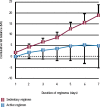The Importance of Energy Balance
- PMID: 29922364
- PMCID: PMC6003580
- DOI: 10.17925/EE.2013.09.02.111
The Importance of Energy Balance
Abstract
Globally, bodyweight and obesity are rising in both the developing and developed world. To maintain a stable bodyweight, energy intake must, over time, exactly equal energy expenditure, a state known as energy balance. An understanding of the physiologic control of energy balance may be useful for designing interventions to tackle the obesity epidemic worldwide. Obesity occurs when the body's energy balance is positive (i.e. when energy intake exceeds energy expenditure). Human physiology is biased towards maintaining energy balance at high levels of energy intake and expenditure. As a result, strategies to combat obesity should include a focus on increasing physical activity along with strategies for modifying food intake. An understanding of energy balance leads to the conclusion that prevention of weight gain should be easier than treatment of obesity. Components of energy balance are interdependent, and weight loss requires major behaviour changes, which trigger compensatory decreases in energy expenditure that facilitate weight regain. Prevention of weight gain can be accomplished by smaller behaviour changes. In addition to being easier to sustain than larger behaviour changes, smaller ones produce less compensation by the energy balance regulatory system. It has been estimated that relatively small changes in energy intake and expenditure totaling 100 kcal per day could arrest weight gain in most people. Interventions that advocate small changes have shown promising levels of success.
Keywords: Energy balance; obesity; physical activity.
Conflict of interest statement
Disclosure: James O Hill has advisory roles for General Mills, Mcdonald’s, Mccormick, and Wrigley; grant support from the american Beverage association (ABA); and research support from Gi Dynamics and Novo Nordisk. Holly R Wyatt has grant support from the ABA; research support from Gi dynamics and Novo Nordisk; and advisory roles for Eisai, Retrofit, and Wellspring. John C Peters has grant support from the ABA.
Figures
References
-
- Finkelstein EA, Trogdon JG, Cohen JW. et al. Annual medical spending attributable to obesity: Payer-and service-specific estimates. Health Affairs. 2009a;28:w822–w31. - PubMed
-
- Finkelstein EA, Trogdon JG, Cohen JW. et al. Annual medical spending attributable to obesity: payer-and service-specific estimates. Health Aff (Millwood) 2009b;28:w822–31. - PubMed
-
- Flegal KM, Carroll MD, Ogden CL. et al. Prevalence and trends in obesity among US adults, 1999–2000. JAMA. 2002;288:1723–7. - PubMed
-
- Ogden CL, Carroll MD, Kit BK, Prevalence of obesity in the United States, 2009–2010. NCHS Data Brief. 2012. pp. 1–8. - PubMed
-
- Haslam DW, James WP. Obesity. Lancet. 2005;366:1197–209. - PubMed
Publication types
LinkOut - more resources
Full Text Sources
Research Materials



